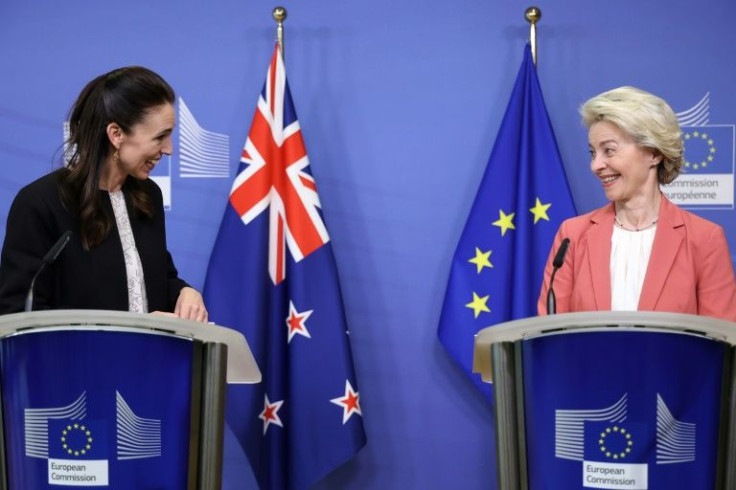EU And New Zealand Seal 'State-of-the-art' Trade Deal
European Commission chief Ursula von der Leyen said Thursday the EU and New Zealand had sealed a free trade deal after four years of talks, promising it would deepen ties.
"This is a historic moment in our cooperation," von der Leyen told reporters at a joint press statement with New Zealand's Prime Minister Jacinda Ardern, adding that the deal had come after "tough negotiations".
Ardern hailed a "historic further milestone in the strong partnership between two closely-connected like-minded friends."
The pact brings economies of vastly different sizes closer together: New Zealand has a population of just five million people against the EU's 450 million.
Once it has survived a long ratification process, the EU said the deal would eliminate all tariffs on its exports to New Zealand and will open markets in key sectors such as financial services, telecommunications, maritime transport and delivery services.
Both sides underlined environmental issues, amid concern in some corners of Europe that trade deals are a threat to climate goals and upholding rights of workers.
"This free trade agreement includes high ambition outcomes in areas related to the Paris Agreement, climate action, labour rights, gender equality, and harmful fishery subsidies," New Zealand Trade Minister Damien O'Connor told reporters after a final round of talks in Brussels.

His EU counterpart Valdis Dombrovskis called the deal "a state of the art trade deal for the EU" that had "shared values with sustainability at its core."
The New Zealand agreement, which will be legally finalised over the next months, will have to be agreed by the bloc's member states as well as European Parliament.
The deal with New Zealand will lend comfort to European countries that had grown increasingly frustrated with the lack of progress on opening new trade ties with international partners.
The EU has struggled in recent years to secure the backing of all 27 member states as well as the European Parliament on trade deals, which were once a central policy for the bloc.
France has led the doubters on the wisdom of trade pacts, and French farmers have voiced concerns that the accord with New Zealand would unfairly open their market to New Zealand imports.
The EU is currently also engaged in talks with India, Indonesia, New Zealand and Australia.
Of particular concern in France is a negotiated deal with the South American trade bloc Mercosur that has yet to be signed as several countries demand concrete commitments from Brazil against the deforestation of the Amazon.
© Copyright AFP 2024. All rights reserved.











